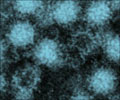A tobacco plant has yielded a unique vaccine for norovirus, a dreaded cause of diarrhoea and vomiting.
A tobacco plant has yielded a unique vaccine for norovirus, a dreaded cause of diarrhoea and vomiting.
Also known as the "cruise ship virus", this microbe can spread like wildfire through passenger liners, schools, offices and military bases.The new vaccine against it was "manufactured" using an engineered plant virus.
Dr. Charles Arntzen, while speaking on how scientists are enlisting plants to battle various infectious diseases at the 238th National Meeting of the American Chemical Society (ACS) on Tuesday, said that plant biotechnology opened the door to more efficient, inexpensive ways to bring vaccines quickly to the public, especially critical in times when viruses mutate into unpredictable new strains.
"The recent outbreak of H1N1 influenza virus has once again reminded us of the ability of disease-causing agents to mutate into new and dangerous forms. It will be at least six months until a vaccine for this new strain will be available, and it will take even longer to create large stock piles of vaccine.
For a case like the H1N1 influenza virus, you want to be able to move very rapidly and introduce a commercial vaccine in the shortest possible time. We think we have a major advantage in using engineered plant viruses to scale-up vaccine manufacture within weeks instead of months," Arntzen said.
Noroviruses are always mutating, which is why they are a moving target for vaccine developers.
Advertisement
The researcher says that plant biotechnology could create a cheaper, quicker vaccine manufacturing technique uniquely suited to combat mutating viruses like norovirus and the flu.
Advertisement
"It essentially closes down wings of hospitals, schools, day care centers and homes for the elderly. In the case of the military, it can shut down an entire ship and delay military operations while there is a cleanup in process. Because the disease spreads so rapidly, the major economic consequences are caused by the disruption of normal daily life and commerce," says Arntzen.
Considering that norovirus will continue to evolve new strains, Arntzen and colleagues have designed a vaccine manufacturing process quick enough to keep up with it and other shape-shifting viruses.
"With plant-based vaccines, we can generate the first gram quantities of the drug and do clinical tests within eight to 10 weeks... We could easily scale that up for commercial use in a two to four month period," says Arntzen.
Plant-based vaccine production also offers cost advantages because building greenhouses is more cost effective than the sterilized facilities, expensive manufacturing technology and stainless steel tanks required for the insect or mammalian cell cultures used in most traditional vaccines.
"The other cost advantages relate to vaccine purification and formulation. Purification from plant extracts is simpler because there are no infectious agents to clean up. There are no viruses in plants which can infect humans, so you don't have to worry about viral removal," says Arntzen.
To battle each new strain of the norovirus and to keep full resistance to older strains, Arntzen says the vaccine could be administered as a booster every 12 to 18 months.
After successful experiments in mice, the researchers are developing a nasal delivery system for the virus-like particles.
Arntzen expects to start clinical trials in late 2009 or early 2010.
Source-ANI
LIN














